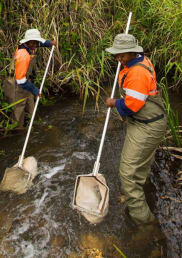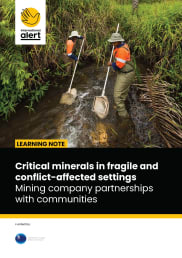Human rights due diligence in conflict-affected settings: Guidance for extractives industries
This guidance addresses the question of how companies can ensure respect for human rights in their operations without exacerbating or generating conflicts.
Since International Alert published its Conflict-sensitive business practice in 2005, the field of business and human rights has emerged as a highly influential area of theory and practice.
However, while there has been substantial uptake of the United Nations Guiding Principles on Business and Human Rights, particularly around company efforts to undertake more rigorous human rights due diligence, there is little available guidance on what this means for companies operating in conflict-affected settings.
This is significant, because in conflict-affected settings the likelihood and severity of human rights violations is considerably higher, and the most vulnerable members of society are likely to disproportionately experience more negative impacts and be less resilient to external shocks.
In these complex and volatile environments, thorough and robust human rights due diligence (HRDD) is all the more important, since companies cannot rely on standard approaches.
The guidance will:
- help companies from the extractive sector understand any conflicts in their operating context and identify the implications these have for HRDD
- provide tools, case studies and recommendations to help companies and other practitioners conducting HRDD in conflict-affected settings
- contribute to ongoing debates on business, human rights and conflict sensitivity
The primary audiences of the guidance are those involved in overseeing or undertaking due diligence activities, including staff from extractive companies or practitioners, advisers and consultants working with extractives companies.
Download here
Flashpoint briefing 1: Conflict sensitivity and the pre-investment stage
Flashpoint briefing 2: Conflict sensitivity and supply chain due diligence






